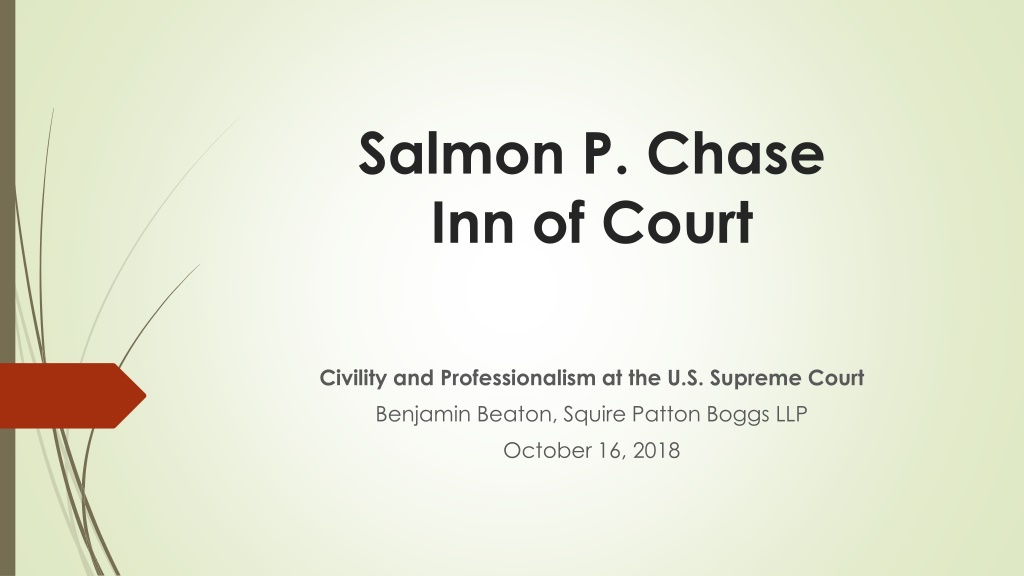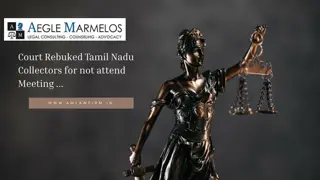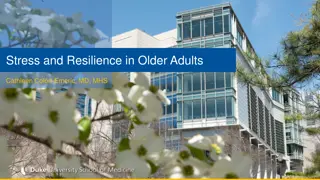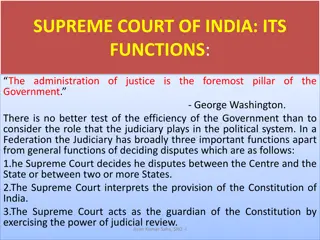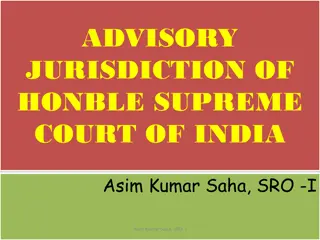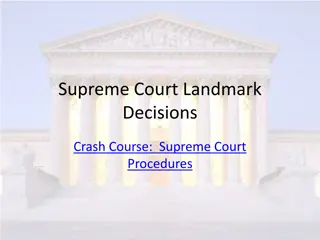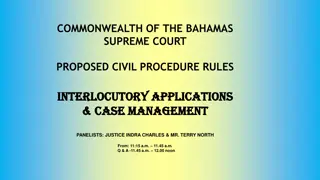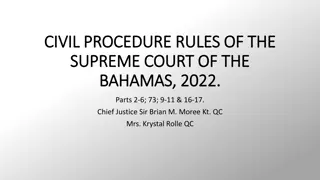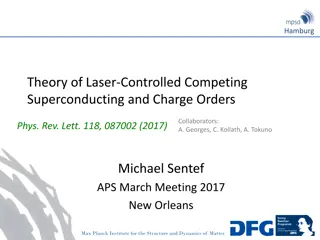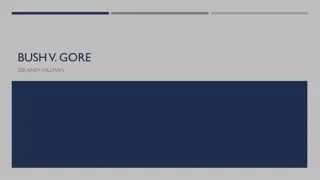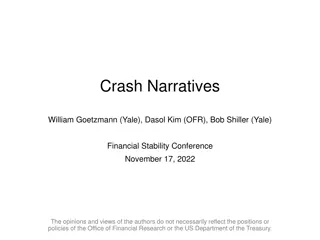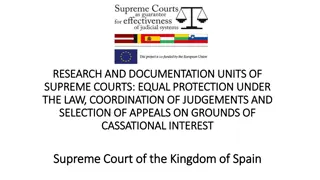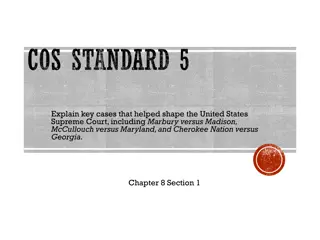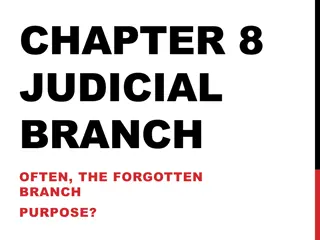Inside the U.S. Supreme Court: Competing Narratives and Resilience in 2018
The content discusses contrasting perspectives on the U.S. Supreme Court in 2018, both inside and outside the institution. It explores the Court's resiliency amid political challenges and highlights the importance of institutional norms like civility and professionalism. The duties and functions of the Court are outlined to provide context to its operations and decision-making processes.
Download Presentation

Please find below an Image/Link to download the presentation.
The content on the website is provided AS IS for your information and personal use only. It may not be sold, licensed, or shared on other websites without obtaining consent from the author. Download presentation by click this link. If you encounter any issues during the download, it is possible that the publisher has removed the file from their server.
E N D
Presentation Transcript
Salmon P. Chase Inn of Court Civility and Professionalism at the U.S. Supreme Court Benjamin Beaton, Squire Patton Boggs LLP October 16, 2018
Special thanks to Judge Brueggemann, JB Lind, and the Pupilage Group for their research, editing, and suggestions for this program.
Competing Narratives: Outside the Supreme Court Slate: The Supreme Court is a historically regressive and presently expendableInstitution. Washington Post: The Supreme Court celebrates its own corruption. Dahlia Lithwick: America s compromised Supreme Court: With Kavanaugh on the bench, the court will struggle to retain its authority. Prof. Eric Segall: A supremely dark future. USA Today: Witches plan to hex Brett Kavanaugh using effigies, coffin nails, graveyard dirt and more. Howappealing.abovethelaw.com
Competing Narratives: Inside the Supreme Court Bloomberg: Supreme Court Shakes Hands and Goes Back to Work: The justices welcome Kavanaugh with rituals totally unlike his raucous confirmation. Mark Joseph Stern, Slate: Brett Kavanaugh s first day on the bench was disturbingly normal. Washington Post: At Kavanaugh s Supreme Court debut, protesters outside, business as usual inside. USA Today: Brett Kavanaugh s first day on the Supreme Court bench includes warm welcome and some pinching. Reuters: For Kavanaugh, a collegial start to Supreme Court career. Howappealing.abovethelaw.com
The Supreme Court in 2018: Stable & Independent, or Uncertain & Divisive? Can the work inside the Supreme Court really carry on while the political fighting outside the Court persists? Yes: Reports of the Supreme Court s demise in our legal system are premature. Strong institutional norms of civility, professionalism, and collegiality keep the Court s work on track. But these norms cannot be taken for granted or the Court will suffer.
Context: What does the Court actually do? What explains the Court s resiliency? Duties are limited, straightforward, and consistent: Grant or deny cert petitions Review merits briefs Hear argument Vote at conference, assign opinions, draft and circulate majorities and dissents Revising and joining opinions Dealing with stay motions and other petitions
Context: What does the Court not do? The passive virtues: other reasons for the Court s stability Limited agenda Takes cases as they come little ability to set its own agenda Conversely, capable of limiting its own agenda Declining number of cases Limited public engagement Makes news through final decisions, not news-cycle soundbites No cameras! Limited staff 4 or 5 law clerks, 2 secretaries, 1 chambers aide (akin to a paralegal) Louis D. Brandeis (circa 1940): "The reason the public thinks so much of the Justices of the Supreme Court is that they are almost the only people in Washington who do their own work." Junior White House lawyer (1983): only Supreme Court justices and schoolchildren are expected to and do take the entire summer off.
The Supreme Court: Organized by norms & customs Few hard-and-fast rules Constitutional separation: An independent branch with great authority to control its operations Not bound by the Judicial Code of Conduct Norms and customs generally control Precedent: Lengthy, continuous, and consistent operations Candor: Known rules and open dialogue within the Court Transparency: Work product scrutinized outside the Court Respect: For each other, for the bar, for other courts
The Supreme Court: Civility & Collegiality The cert pool 36 handshakes Decorum and seniority prevail at argument Non-working lunches Less discussion, more revision Hunting lessons? Summer vacations! 8 Justices at the White House for Kavanaugh swearing-in
The Supreme Court: Effects of Civility & Collegiality Longstanding commitment to neutral rules of the game Law clerks serving the institution, not an ideology Transparency and accountability in the Court s work product Sharper reasoning and clearer decisions from forthright critiques There is nothing better than an impressive dissent ... to refine and clarify the issues. [D]issents, if well- reasoned, almost invariably make the majority opinion stronger. --Ruth Bader Ginsburg Playing the (very) long game My senior colleague, Justice John Paul Stevens, he stepped down when he was 90, so I think I have about at least five more years. Ruth Bader Ginsburg (2018) Justices Scalia and Ginsburg, for example, served together, with one interruption, from 1982 to 2016 Turning the other cheek When a thoughtless or unkind word is spoken, best tune out. Reacting in anger or annoyance will not advance one s ability to persuade. --Ruth Bader Ginsburg Cross-ideological friendships
The Scalia-Ginsburg Connection Scalia: Ruth s the only [colleague] from whom I recall regularly receiving comments for improvements rather than corrections. Not this is wrong, Nino but the point would be even strong if. Ruth and I had developed something of a mutual improvement society Ginsburg: If our friendship encourages others to appreciate that some very good people have ideas with which we disagree, and that, despite differences, people of goodwill can pull together for the well-being of the institutions we serve and our country, I will be overjoyed, as I am confident Justice Scalia would be. Scalia Speaks: Reflections on Law, Faith and Life Well Lived
The Scalia-Ginsburg Connection SCALIA, GINSBURG:Sep rate strands unite in friction To protect our country s core. This, the strength of our nation, Thus is our Court s design: We are kindred, We are nine. SCALIA: To strive for definition, GINSBURG: To question and engage, SCALIA: Let us speak to our tradition GINSBURG: Or address a future age. SCALIA:This, the duty upon us GINSBURG:This, the freedom SCALIA, GINSBURG: To judge how our strands are spun: This makes us different: SCALIA:We are one COMMENTATOR: But why would you do this for your enemy? GINSBURG: We are one decision from forging the source of tomorrow GINSBURG, SCALIA: Enemy? SCALIA:One decision from shifting the tide GINSBURG: Hardly. SCALIA, GINSBURG: Always one decision from charting the course we will steer For our future Is unclear, But one thing is constant The Constitution we revere. SCALIA: Sheer applesauce. GINSBURG: I would not. But I would do this for my friend. We are stewards of this trust; We uphold it as we must, For the work of our Court is just Begun COMMENTATOR:Friend? But you two are so different! SCALIA, GINSBURG: Yes: And this is why we will see justice done: We are different; We are one. SCALIA, GINSBURG (cont d): We are different. We are one. Derrick Wang Scalia/Ginsburg: A (Gentle) Parody of Operatic Proportions, 38 Colum. J.L. & Arts 239 (2015).
The Supreme Court: What don t we see? Cameras! Leaks Pregame huddles & impromptu conferences Ad hominem attacks Naked political arguments Spillover across cases and terms
The bad old days? The Personnel File Musical chairs: 4 chiefs in first 12 years Midnight Judges: Marbury & the Federalists v. Madison & patronage John Quincy Adams refused Chief Justice position Samuel Chase impeachment Old Bacon Face "John Marshall has made his decision; now let him enforce it! Pres. Andrew Jackson McReynolds didn t speak to Brandeis Four Scorpions in a bottle William O. Douglas Abe Fortas and LBJ speechwriting and bombing targets The Rule of Five
The bad old days? Impeach Earl Warren
The bad old days? The Past as Precedent But Precedent Can Be Overruled Dred Scott v. Sandford (7-2) Plessy v. Ferguson (8-1) (John Marshall Harlan, dissenting) Berea College v. Kentucky (John Marshall Harlan, dissenting) Lochner v. New York (5-4) (John Marshall Harlan, dissenting) Buck v. Bell, Oliver Wendell Holmes ( Three generations of imbeciles are enough. ) (8-1) Korematsuv. United States (6-3) (overruled just last year)
Collegiality at the Court: What does it mean for us? The Supreme Court as a surprising source of civility and collegiality If not Conrad s Boarding House for the John Marshall Court Even if some Justices push the envelope. Pure applesauce. The Court s next bit of interpretive jiggery-pokery I would hide my head in a bag. I think [Kaepernick sprotest] is dumb and disrespectful. Notorious RBG Federalist No. 51: If men were angels, no government would be necessary
Collegiality at the Court: What does it mean for us? Many of these principles reflected in the Rules of Professional Conduct Attorney conduct SCR 3.130(3.3) Candor toward the tribunal SCR 3.130(3.4) Fairness to opposing party and counsel SCR 3.130(3.5) Impartiality and decorum of the tribunal SCR 3.130(3.8) Special responsibilities of a prosecutor SCR 3.130(4.1) Truthfulness in statements to others
Collegiality at the Court: What does it mean for us? Judges can learn too Kentucky Judicial Canons Rule 1.2 Promoting Confidence in the Judiciary A judge shall act at all times in a manner that promotes public confidence in the independence, integrity, and impartiality of the judiciary, and shall avoid impropriety and the appearance of impropriety. Rule 2.5(B) Competence, Diligence, and Cooperation: A judge shall cooperate with other judges and court officials in the administration of court business. Rule 3 A Judge Shall Conduct the Judge's Personal and Extrajudicial Activities to Minimize the Risk of Conflict with the Obligations of Judicial Office
Tonights Speaker BENJAMIN BEATON is litigation partner with Squire Patton Boggs LLP. He graduated from Centre College and Columbia Law School, where he was an articles editor for the law review. At the start of his legal career, Ben clerked on the U.S. Supreme Court for Justice Ruth Bader Ginsburg and the U.S. Court of Appeals for the D.C. Circuit for Judge A. Raymond Randolph. He also traveled to Kampala, Uganda as a legal fellow with International Justice Mission focusing on rule-of-law issues, and to London, England as a Temple Bar Scholar. Before joining Squire, Ben worked for several years at Sidley Austin LLP in Washington. He has practiced at all levels of the federal and state-court systems, with an emphasis on civil, appellate, and administrative-law matters. In the Michigan Law Review, Ben and Sixth Circuit Judge Amul Thapar recently published an article, entitled The Pragmatism of Interpretation, reviewing Judge Richard Posner s book on the federal courts. Before law school, Ben worked in Frankfort for the Kentucky Cabinet for Health and Family Services and in Washington for a US Representative from his home district in west Kentucky. He is a native of Paducah and currently lives in Fort Mitchell.
ATTACHMENT B Kentucky Rules of Professional Responsibility
SCR 3.130(3.3) Candor toward the tribunal (a) A lawyer shall not knowingly: (1) make a false statement of fact or law to a tribunal or fail to correct a false statement of material fact or law previously made to the tribunal by the lawyer; (2) fail to disclose to the tribunal published legal authority in the controlling jurisdiction known to the lawyer to be directly adverse to the position of the client and not disclosed by opposing counsel; or (3) offer evidence that the lawyer knows to be false. If a lawyer, the lawyer s client, or a witness called by the lawyer, has offered material evidence and the lawyer comes to know of its falsity, the lawyer shall take reasonable remedial measures, including, if necessary, disclosure to the tribunal. A lawyer may refuse to offer evidence, other than the testimony of a defendant in a criminal matter that the lawyer reasonably believes is false. (b) A lawyer who represents a client in an adjudicative proceeding and who knows that a person intends to engage, is engaging or has engaged in criminal or fraudulent conduct related to the proceeding shall take reasonable remedial measures, including, if necessary, disclosure to the tribunal. (c) The duties stated in paragraphs (a) and (b) continue to the conclusion of the proceeding, and apply even if compliance requires disclosure of information otherwise protected by Rule 1.6. (d) In an ex parte proceeding, a lawyer shall inform SCR 3.130(3.4) (d) In an ex parte proceeding, a lawyer shall inform the tribunal of all material facts known to the lawyer which will enable the tribunal to make an informed decision, whether or not the facts are adverse.
SCR 3.130(3.4) Fairness to opposing party and counsel A lawyer shall not: (a) unlawfully obstruct another party's access to evidence or unlawfully alter, destroy or conceal a document or other material having potential evidentiary value. A lawyer shall not counsel or assist another person to do any such act; (b) knowingly falsify evidence, counsel or assist a witness to testify falsely, or offer an inducement to a witness that is prohibited by law; (c) knowingly disobey an obligation under the rules of a tribunal except for an open refusal based on an assertion that no valid obligation exists; (d) in pretrial procedure, make a frivolous discovery request or deliberately fail to make reasonably diligent effort to comply with a legally proper discovery request by an opposing party; (e) in trial, allude to any matter that the lawyer does not reasonably believe is relevant or that will not be supported by admissible evidence, assert personal knowledge of facts in issue except when testifying as a witness, or state a personal opinion as to the justness of a cause, the credibility of a witness, the culpability of a civil litigant or the guilt or innocence of an accused; or (f) present, participate in presenting, or threaten to present criminal or disciplinary charges solely to obtain an advantage in any civil or criminal matter; or (g) request a person other than a client to refrain from voluntarily giving relevant information to another party unless: (1) the person is a relative or agent who supervises, directs or regularly consults with the client concerning the matter or has authority to obligate the client with respect to the matter; and (2) the lawyer reasonably believes that the person s interests will not be adversely affected by refraining from giving such information. he tribunal of all material facts known to the lawyer which will enable the tribunal to make an informed decision, whether or not the facts are adverse.
SCR 3.130(3.5) Impartiality and decorum of the tribunal A lawyer shall not: (a) seek to influence a judge, juror, prospective juror or other official by means prohibited by law; (b) communicate ex parte with such a person as to the merits of the cause except as permitted by law or court order; (c) communicate with a juror or prospective juror after discharge of the jury if: (1) the communication is prohibited by law, local rule, or court order; (2) the juror has made known to the lawyer a desire not to communicate; or (3) the communication involves misrepresentation, coercion, duress or harassment; or (d) engage in conduct intended to disrupt a tribunal.
SCR 3.130(3.8) Special responsibilities of a prosecutor The prosecutor in a criminal case shall: (a) refrain from prosecuting a charge that the prosecutor knows is not supported by probable cause; (b) make reasonable efforts to assure that the accused has been advised of the right to, and the procedure for obtaining, counsel and has been given reasonable opportunity to obtain counsel; (c) make timely disclosure to the defense of all evidence or information known to the prosecutor that tends to negate the guilt of the accused or mitigates the offense, and, in connection with sentencing, disclose to the defense and to the tribunal all unprivileged mitigating information known to the prosecutor, except when the prosecutor is relieved of this responsibility by a protective order of the tribunal; (d) not subpoena a lawyer in a grand jury or other criminal proceeding to present evidence about a past or present client unless the prosecutor reasonably believes: (1) the information sought is not protected from disclosure by any applicable (2) the evidence sought is essential to the successful completion of an ongoing prosecution; and (3) there is no other feasible alternative to obtain the information; (e) refrain, except for statements that are necessary to inform the public of the nature and extent of the prosecutor's action and that serve a legitimate law enforcement purpose, from making extrajudicial comments that have a substantial likelihood of heightening public condemnation of the accused and exercise reasonable care to prevent investigators, law enforcement personnel, employees or other persons under the supervision of the prosecutor in a criminal case from making an extrajudicial statement that the prosecutor would be prohibited from making under Rule 3.6 or this Rule. privilege; investigation or
SCR 3.130(4.1) Truthfulness in statements to others In the course of representing a client a lawyer: (a) shall not knowingly make a false statement of material fact or law to a third person; and (b) if a false statement of material fact or law has been made, shall take reasonable remedial measures to avoid assisting a fraudulent or criminal act by a client including, if necessary, disclosure of a material fact, unless prohibited by Rule 1.6
SCR 3.130(8.2) Judicial and legal officials (a) A lawyer shall not make a statement that the lawyer knows to be false or with reckless disregard as to its truth or falsity concerning the qualifications or integrity of a judge, adjudicatory officer or public legal officer, or of a candidate for election or appointment to judicial or legal office. (b) A lawyer who is a candidate for judicial office shall comply with the applicable provisions of the Code of Judicial Conduct.
ATTACHMENT C Kentucky Code of Judicial Conduct (Note: Ohio s Code of Judicial Conduct is analogous, and nearly identical, to the Kentucky Judicial Canons)
Canon 1. A Judge Shall Uphold and Promote the Independence, Integrity, and Impartiality of the Judiciary, and Shall Avoid Impropriety and the Appearance of Impropriety a. Rule 1.2: Promoting Confidence in the Judiciary A judge shall act at all times in a manner that promotes public confidence in the independence, integrity, and impartiality of the judiciary, and shall avoid impropriety and the appearance of impropriety. Comment [1] Public confidence in the judiciary is eroded by improper conduct and conduct that creates the appearance of impropriety. This principle applies to both the professional and personal conduct of a judge. Comment [5] Actual improprieties include violations of law, court rules, or provisions of this Code. The test for appearance of impropriety is whether the conduct would create in reasonable minds a perception that the judge engaged in conduct that reflects adversely on the judge s honesty, impartiality, temperament, or fitness to serve as a judge. Canon 2. A Judge Shall Perform the Duties of Judicial Office Impartially, Competently, and Diligently a. Rule 2.5(B) Competence, Diligence, and Cooperation: A judge shall cooperate with other judges and court officials in the administration of court business. Canon 3. Risk of Conflict with the Obligations of Judicial Office A Judge Shall Conduct the Judge's Personal and Extrajudicial Activities to Minimize the Canon 4. Activity that is Inconsistent with the Independence, Integrity, or Impartiality of the Judiciary. This Canon is to be Interpreted Consistent with the First Amendment to the United States Constitution, Other Constitutional Requirements, Statutes, Other Court Rules, and Decisional Law. A Judge or Candidate for Judicial Office Shall Not Engage in Political or Campaign
31 ATTACHMENT C Ohio Rules of Professional Conduct
RULE 1.4: COMMUNICATION (a) A lawyer shall do all of the following: (1) promptly inform the client of any decision or circumstance with respect to which the client s informed consent is required by these rules; (2) reasonably consult with the client about the means by which the client s objectives are to be accomplished; (3) keep the client reasonably informed about the status of the matter; (4) comply as soon as practicable with reasonable requests for information from the client; (5) consult with the client about any relevant limitation on the lawyer s conduct when the lawyer knows that the client expects assistance not permitted by the Ohio Rules of Professional Conduct or other law. (b) A lawyer shall explain a matter to the extent reasonably necessary to permit the client to make informed decisions regarding the representation. (c) A lawyer shall inform a client at the time of the client s engagement of the lawyer or at any time subsequent to the engagement if the lawyer does not maintain professional liability insurance in the amounts of at least one hundred thousand dollars per occurrence and three hundred thousand dollars in the aggregate or if the lawyer s professional liability insurance is terminated. The notice shall be provided to the client on a separate form set forth following this rule and shall be signed by the client. (1) A lawyer shall maintain a copy of the notice signed by the client for five years after termination of representation of the client. (2) A lawyer who is involved in the division of fees pursuant to Rule 1.5(e) shall inform the client as required by division (c) of this rule before the client is asked to agree to the division of fees. (3) The notice required by division (c) of this rule shall not apply to either of the following: (i) A lawyer who is employed by a governmental entity and renders services pursuant to that employment; (ii) A lawyer who renders legal services to an entity that employs the lawyer as in-house counsel.
RULE 3.3: CANDOR TOWARD THE TRIBUNAL (a) A lawyer shall not knowingly do any of the following: (1) make a false statement of fact or law to a tribunal or fail to correct a false statement of material fact or law previously made to the tribunal by the lawyer; (2) fail to disclose to the tribunal legal authority in the controlling jurisdiction known to the lawyer to be directly adverse to the position of the client and not disclosed by opposing counsel; (3) offer evidence that the lawyer knows to be false. If a lawyer, the lawyer s client, or a witness called by the lawyer has offered material evidence and the lawyer comes to know of its falsity, the lawyer shall take reasonable measures to remedy the situation, including, if necessary, disclosure to the tribunal. A lawyer may refuse to offer evidence, other than the testimony of a defendant in a criminal matter, that the lawyer reasonably believes is false. (b) A lawyer who represents a client in an adjudicative proceeding and who knows that a person, including the client, intends to engage, is engaging, or has engaged in criminal or fraudulent conduct related to the proceeding shall take reasonable measures to remedy the situation, including, if necessary, disclosure to the tribunal. (c) The duties stated in divisions (a) and (b) of this rule continue until the issue to which the duty relates is determined by the highest tribunal that may consider the issue, or the time has expired for such determination, and apply even if compliance requires disclosure of information otherwise protected by Rule 1.6. (d) In an ex parte proceeding, a lawyer shall inform the tribunal of all material facts known to the lawyer that will enable the tribunal to make an informed decision, whether or not the facts are adverse.
RULE 3.4: FAIRNESS TO OPPOSING PARTY AND COUNSEL A lawyer shall not do any of the following: (a) unlawfully obstruct another party s access to evidence; unlawfully alter, destroy, or conceal a document or other material having potential evidentiary value; or counsel or assist another person to do any such act; (b) falsify evidence, counsel or assist a witness to testify falsely, or offer an inducement to a witness that is prohibited by law; (c) knowingly disobey an obligation under the rules of a tribunal, except for an open refusal based on a good faith assertion that no valid obligation exists; (d) in pretrial procedure, intentionally or habitually make a frivolous motion or discovery request or fail to make reasonably diligent effort to comply with a legally proper discovery request by an opposing party; (e) in trial, allude to any matter that the lawyer does not reasonably believe is relevant or that will not be supported by admissible evidence or by a good-faith belief that such evidence may exist, assert personal knowledge of facts in issue except when testifying as a witness, or state a personal opinion as to the justness of a cause, the credibility of a witness, the culpability of a civil litigant, or the guilt or innocence of an accused; (f) [RESERVED] (g) advise or cause a person to hide or to leave the jurisdiction of a tribunal for the purpose of becoming unavailable as a witness.
RULE 3.5: IMPARTIALITY AND DECORUM OF THE TRIBUNAL (a) A lawyer shall not do any of the following: (1) seek to influence a judicial officer, juror, prospective juror, or other official by means prohibited by law; (2) lend anything of value or give anything of more than de minimis value to a judicial officer, official, or employee of a tribunal; (3) communicate ex parte with either of the following: (i) a judicial officer or other official as to the merits of the case during the proceeding unless authorized to do so by law or court order; (ii) a juror or prospective juror during the proceeding unless otherwise authorized to do so by law or court order. (4) communicate with a juror or prospective juror after discharge of the jury if any of the following applies: (i) the communication is prohibited by law or court order; (ii) the juror has made known to the lawyer a desire not to communicate; (iii) the communication involves misrepresentation, coercion, duress, or harassment; (5) engage in conduct intended to disrupt a tribunal; (6) engage in undignified or discourteous conduct that is degrading to a tribunal. (b) A lawyer shall reveal promptly to the tribunal improper conduct by a juror or prospective juror, or by another toward a juror, prospective juror, or family member of a juror or prospective juror, of which the lawyer has knowledge.
RULE 8.2: JUDICIAL OFFICIALS (a) A lawyer shall not make a statement that the lawyer knows to be false or with reckless disregard as to its truth or falsity concerning the qualifications or integrity of a judicial officer, or candidate for election or appointment to judicial office. (b) A lawyer who is a candidate for judicial office shall not violate the provisions of the Ohio Code of Judicial Conduct applicable to judicial candidates. (c) A lawyer who is a retired or former judge or magistrate may use a title such as justice, judge, magistrate, Honorable or Hon. when the title is preceded or followed by the word retired, if the lawyer retired in good standing with the Supreme Court, or former, if the lawyer, due to the loss of an election, left judicial office in good standing with the Supreme Court. (d) A lawyer who is a retired or former judge shall not state or imply that the lawyer s former service as a judge enables the lawyer to improperly influence any person or entity, including a government agency or official, or to achieve results by means that violate the Ohio Rules of Professional Conduct or other law.
37 RULE 8.3: REPORTING PROFESSIONAL MISCONDUCT (a) A lawyer who possesses unprivileged knowledge of a violation of the Ohio Rules of Professional Conduct that raises a question as to any lawyer s honesty, trustworthiness, or fitness as a lawyer in other respects, shall inform a disciplinary authority empowered to investigate or act upon such a violation. (b) A lawyer who possesses unprivileged knowledge that a judge has committed a violation of the Ohio Rules of Professional Conduct or applicable rules of judicial conduct shall inform the appropriate authority. (c) Any information obtained by a member of a committee or subcommittee of a bar association, or by a member, employee, or agent of a nonprofit corporation established by a bar association, designed to assist lawyers with substance abuse or mental health problems, provided the information was obtained while the member, employee, or agent was performing duties as a member, employee, or agent of the committee, subcommittee, or nonprofit corporation, shall be privileged for all purposes under this rule.
